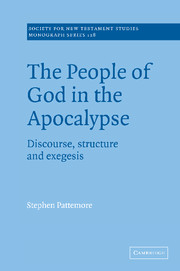Book contents
- Frontmatter
- Contents
- List of figures and table
- Preface
- List of abbreviations
- 1 A question of relevance
- 2 Relevance Theory in biblical interpretation
- 3 A cognitive environment for the Apocalypse
- 4 Souls under the altar – a martyr ecclesiology
- 5 Companions of the Lamb – a messianic ecclesiology
- 6 The New Jerusalem, bride of the Lamb
- 7 Summary and conclusions
- Appendix: Abbreviated discourse outline
- Bibliography
- Index
1 - A question of relevance
Published online by Cambridge University Press: 22 September 2009
- Frontmatter
- Contents
- List of figures and table
- Preface
- List of abbreviations
- 1 A question of relevance
- 2 Relevance Theory in biblical interpretation
- 3 A cognitive environment for the Apocalypse
- 4 Souls under the altar – a martyr ecclesiology
- 5 Companions of the Lamb – a messianic ecclesiology
- 6 The New Jerusalem, bride of the Lamb
- 7 Summary and conclusions
- Appendix: Abbreviated discourse outline
- Bibliography
- Index
Summary
The relevance of the Apocalypse
The Apocalypse of St John has always provoked the question of its own relevance. In the second century its place in the canon was far from assured, with questions raised about its apparent Jewish character, its symbolism, and its apostolic authorship. By the 1990s it could still be described as ‘only marginally canonical’. In between it has both influenced art, literature, and politics and yet suffered from neglect and abuse.
The Apocalypse has been the handbook for millenarian sects of many shades throughout the past two millennia, with increasing frequency and intensity in the periods leading up to the years 1000 and 2000. But it has also been used by those with power, to bolster their position by marginalizing or demonizing others. Through the nineteenth and twentieth centuries, millenarianism of one kind or another, usually formed by an eclectic and harmonizing approach to the books of Revelation and Daniel, has been an important focus, and sometimes a touchstone of orthodoxy, for evangelical Christianity. Millennial anxiety prior to the year 2000, compounded by apocalyptic scenarios proposed for the Y2K computer bug, led to an increase in interest in the Apocalypse and in apocalyptic language and imagery, not only in evangelical circles but in the popular press and media.
Perhaps because of these phenomena, but also simply because of the difficulty of the language and symbolism of the book, and its apparent lack of connection with the modern world, the Apocalypse has, until comparatively recently, suffered considerable neglect in reformed, mainstream, and liberal Christianity.
- Type
- Chapter
- Information
- The People of God in the ApocalypseDiscourse, Structure and Exegesis, pp. 1 - 12Publisher: Cambridge University PressPrint publication year: 2004



